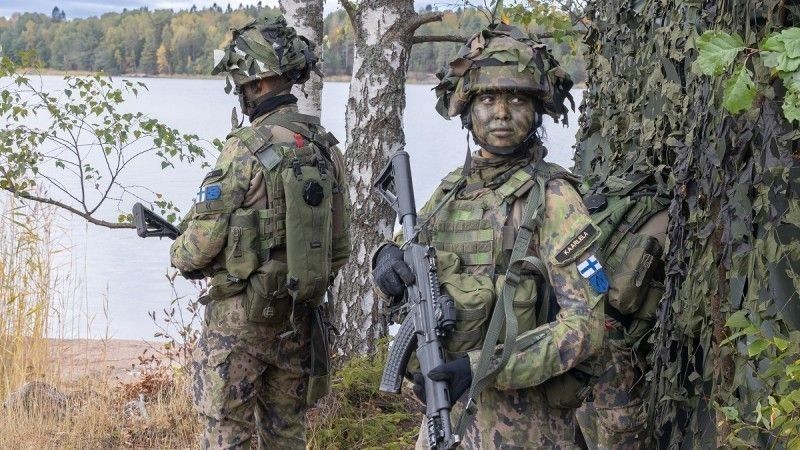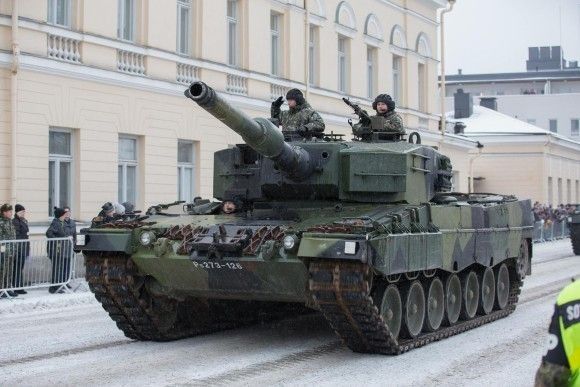Geopolitics
Finland in NATO: 1,340 Kilometres of Putin's Failure

Photo. Puolustusvoimat - Försvarsmakten/Facebook
Over many years, Putin’s men did not hide their intention to destabilize and disrupt NATO’s unity. Assuming that this is a strategic goal for Russia, Moscow would have an open road ahead, toward inflicting political, military, and economic pressure on several European states. As it turned out, the efficiency of the collective defence system in the transatlantic space has been greater than the Russian strategic plans did assume. Nowadays, Russia has a problem explaining how did it happen, that its border with NATO is now more than 1,000 kilometers longer, with Finland joining the alliance. NATO, and all of its members, can now celebrate a key PR success, also enhancing the security system as a whole.
The Russian invasion of Ukraine in 2022 has flipped the table, with the rules definitive for European security since 1945. However, one shall remember that as it happens in the case of any international crisis, negative consequences may emerge simultaneously with a set of positive changes, derived from the emergence of the crisis. And now, as Russia is introducing a rogue, aggressive policy, we are observing one of those positive changes happening to European security. The above refers to Finland joining NATO. That will officially happen on 4th April 2023. The Swedes are next in line - unfortunately, that accession is blocked by the Turkish-Hungarian tandem for now. As Finland has shown, it is not a rejection, it is rather muscle-flexing involving Turkey, as Hungary is hiding behind Turkish actions. And one should expect that sooner than later NATO will be joined by two Nordic nations. That means the security structure in Europe would be reinforced even further. One may speak of the enhancement of the European security system primarily because NATO is becoming a common collective defence system in Europe, except for Austria, or the Republic of Ireland. However, the northern portion of Europe would gain new levels of effectiveness, when it comes to planning and coordinating deterrence and defence efforts.
One should note that Sweden and Finland had been observed getting closer to NATO in the past though. However, as these nations become a part of NATO, an actual part, a systemic scope of that cooperation would become available. Hence the permanent inclusion of Finland, and then, Sweden, in the planning, coordination, and decision-making measures established within NATO shall be viewed as a qualitative change by us all. The capacity to establish military cooperation and use the military infrastructure would be boosted. Let us remember that NATO does not equal the mythical "NATO armies", used as the tool of terror by the Russian and pro-Russian propaganda. NATO is a well-tailored tool created to aggregate assets and Armed Forces of the Allies, to efficiently coordinate the undertaken operations - and use Articles 4 and 5 of the North Atlantic Treaty in extreme cases. The latter includes non-military matters as well - and that remains highly relevant. NATO does allow to work in crises below the threshold of war when it comes to tools used to maintain Transatlantic security.

Let us note the use of coordination support throughout the pandemic, not to mention the contributions and support provided to Turkey, following the recent earthquake in the region. From the Polish point of view, it is visible what the investment in the accession process turned out to be - not only did it result in a better defensive stance, but also enhancement of numerous other political and military aspects. Finland will now become a beneficiary of these matters - in a very special period. When no doubts emerge, when it comes to the alliance's identity in the coming years. Since 2016, we have been witnessing a return to effectiveness in the domains of deterrence and defence, emphasized by the new force projection capabilities, enhanced ISR system (through joint missions conducted by dedicated RQ-4 UAVs), and increased scale of military exercises. One could even say that in the current conditions, we are dealing with doubled NATO attraction. Doubled, as apart from strategic or political benefits, NATO may also attract Sweden or Finland with its military side.
And that is not limited to the military aspect defined solely by the US power alone. Either way, Finland would become a NATO member state as a proven partner, when it comes to undertaking state resilience investments. We are dealing with well-organized armed forces, and a long-term non-military planning policy, introduced by the deployment of the total defence principles. One should remember that Finland entering NATO does not translate into a country that has a major defensive potential disproportion entering the alliance, requiring the introduction of a protective umbrella over its territory and population. Finland and Sweden are not perceived as superpowers. But the neutrality they had been expressing before, in the military, and political dimensions, also imposed numerous obligations they had to face, when it comes to the defence domain. Hence, Finland, and soon Sweden, will be able to play an important role in the collective defence scheme. Similarly, Poland does, in its dual role - as a provider and receiver of security, a full-fledged NATO member state.

Photo. puolustusvoimat
Not to mention aspects including the positioning of that state in relation to Russia, the Baltic Sea, or the strategically important Far North. Let us see, first, that this is the main matter to which the 1,340 kilometers mentioned in the title refer. In that case, we are speaking of a security challenge faced by Finland alone, but soon, also by NATO as a whole. It should be clearly stated - Russia has become a rogue state under Putin, resorting to violence and military aggression targeting other sovereign entities in the international arena - such as Georgia or Ukraine. And that will probably not change in the coming years. Defensive planning should not assume that this positive scenario is a possibility of any sort. Thus, this is the key motivator for Finland to abandon its neutrality and seek security guarantees founded in NATO. And if NATO agrees to Finland joining the collective defence system, then indeed, the actual growth of competency in this part of Europe may be required. That would not happen daily. It is happening already, even without the actual accession. Hence the major role of military exercises, US or other NATO activities in the region, that we have been observing over the recent months, not to mention the activities that had been undertaken before 2022. Being direct, one may say that NATO is facing a serious challenge, but Finland needs that kind of support right now. But that would not be done in a vacuum, and the cost would not be covered exclusively by NATO.
One should mention the might of the Finnish economy or the high-tech sector, and the overall efficiency the society exhibits in the resilience domain. Not without a reason, the Nordic nations are listed as exemplary leaders in preparing their societies to face crises, wars included. However, that would still be a hard lesson, in adapting allied operations - that fact cannot be hidden here. One shall remember how much work was required in adapting the allied processes to the strategic and operational perception of our region, including Poland. In modern times, threats below the threshold of war are the biggest challenge for Finnish security, also within the context of Helsinki's NATO membership. The Nordic states have been getting ready for hybrid scenarios for quite some time now - including the cyber/info response capabilities, acts of terror, sabotage, and covert operations targeting critical infrastructure and densely populated areas, or attempts at inspiring social tensions and increased levels of activity of the Russian intelligence. However, this is not an abstract concept devised by the Finnish state organs. We are dealing with tangible decisions and the actual preparation of the society, state authorities, and so on, to face such scenarios. The preparatory steps range from the involvement of joint assets of the Armed Forces and uniformed services in exercises to expansive social and community educational programmes, all across Finland. And yet again, NATO will become an important reinforcer of the Finnish efforts within these scopes, and the Finns would become a reinforcement of the NATO assets. Not to mention the role Finland has been playing so far, from the point of view of the EU cyber-security efforts.
However, apart from new obligations and burdens that need to be handled by NATO, we also need to mention a positive aspect of that "1,000 kilometers long, strategic Putin's success". The Russians only see NATO as bad news, during the rule of the current team at the Kremlin. Furthermore, NATO has been means of deterrence for years, and Russia has been using it as a reference point for its military and political actions. Propaganda theses on the reasons behind the invasion of Ukraine in 2022 have been a prime example of that, along with threats expressed towards the CEE region - including Lithuania, Latvia, Estonia, or Poland. Not to mention statements suggesting the Kremlin would be pushing NATO away from its borders. And that schizophrenic narrative today includes 1,340 kilometers of border, with another NATO member state. And that happens despite the aggressive stance adopted by Russia, associated with the full-scale invasion of Ukraine. That accession happens, also despite numerous threats, reiterated by Moscow - including nuclear ones. One should have a feel for that cognitive dissonance among the Russian leaders of the political-military-intelligence sphere. The West was to come crawling, facing the Russian political-military might, and NATO's confidence was to be wrecked - resulting in the erosion of the alliance, as a whole. However, the Kremlin's actions resulted in one of the most symbolic and symptomatic NATO expansions, with a neutral nation, such as Finland, abandoning its neutrality and joining NATO. One should disregard the audience that is being fed the Russian propaganda. In the case of that group, the aggression against Ukraine alone has shown major freedom of narrative change by the Kremlin's propagandists.

Photo. Jerry Gunner/flickr/CC BY 2.0.
Thus, when it comes to the Finnish accession, well-known threads may be listed, that are expected to be showcased. One should note that "NATO/US conspiracy reaching other states", and "non-democratic Finnish NATO accession, against the nation's will" narratives may be common. The pro-Russian groups in Poland use similar narratives, so that may be a universal tool in the Russian info-warfare inventory. The most important matter is that "NATO is preparing aggression against Russia" - this narrative is common among Russian, and pro-Russian propagandists. One should note that this matter cannot be overlooked by them. The Russian propagandists also remain unable to stay silent, when the lethality of the Western weapons systems is discussed.
Russia now needs to think about reinforcing its military assets, along more than 1,000 newly introduced kilometers of border with NATO. And this is happening in interesting strategic circumstances, with the Finns playfully debating the Russian military weaknesses along their border, in the media and public sphere. The Finns are making direct claims that many of the "elite" units have been deployed to Ukraine, shedding blood there, and an analogous thing happened to their inventory. These matters were also discussed by us - so they resonated, globally. Russia remains a military threat to states like Finland, but the fears shall not be overstated, and the Russian military potential - idealized. Another myth disseminated by the Russian authorities fell - the omnipotency of the Russian Armed Forces. One look at a map of Europe here, and at the Transatlantic space, speaks volumes of that. Any, hypothetical Russian aggression targeting NATO would require the Kremlin to handle planning from the Arctic to the Black Sea, not to mention Alaska. The shortage of conventional assets remaining at disposal of the Russian Armed Forces would be even weaker, after the war in Ukraine, thus inspiring a lack of confidence among the Generals and strategists residing at the Kremlin. The deterrence reaches new levels, if one is considering it within the scope of hampering Russian neoimperialism. Hence, an important lesson for Poland that soon may perceive the "Suwałki Gap"-alike constructs differently. This, undoubtedly, is a success for NATO, and a failure for Kremlin, when it comes to strategy, global security, and actions undertaken by democratic states. Not only did the attempts to make NATO weaker fail. The alliance's competency grew, and more changes are coming. More nations are standing in a queue to join the alliance, the relevance of which was questioned by Moscow.
The Finnish accession also has an effect broader, stepping beyond the European or Transatlantic security architecture. The democratic states, and the collective defence, show effectiveness through territorial expansion, also in the sphere of beliefs and foundations upon which NATO has been based. One may conclude that a reinforced vision of further steps in the domain of Indo-Pacific cooperation may emerge. NATO's power indirectly translates into a better understanding of the power and meaning that AUKUS has, and further FVEY activities. It also promotes other options, with QUAD topping the list. Showing that collective defence systems may last, they may become more relevant in the era of new challenges emerging in the domain of security and defence - and above all, these systems have not lost their relevance. That may sound trivial, but this should be placed over any visions of "coalitions of the willing", or "strategic autonomies". These intellectual constructs were born across the globe, with the power of attraction of their own. The accession to NATO is not just limited to a statistical summary of several main battle tanks or planes. It also confirms the intangible acceptance of core beliefs that also entailed some tensions and crises, among the members. Any expansion of NATO, the birth of AUKUS, translates into danger for nations that, like Russia, want to impose policy by force or remain unable to formulate a common set of beliefs within their strategy. Considering that, one should say that the Finnish accession has not been impressive - neither in Moscow, nor in Beijing.
